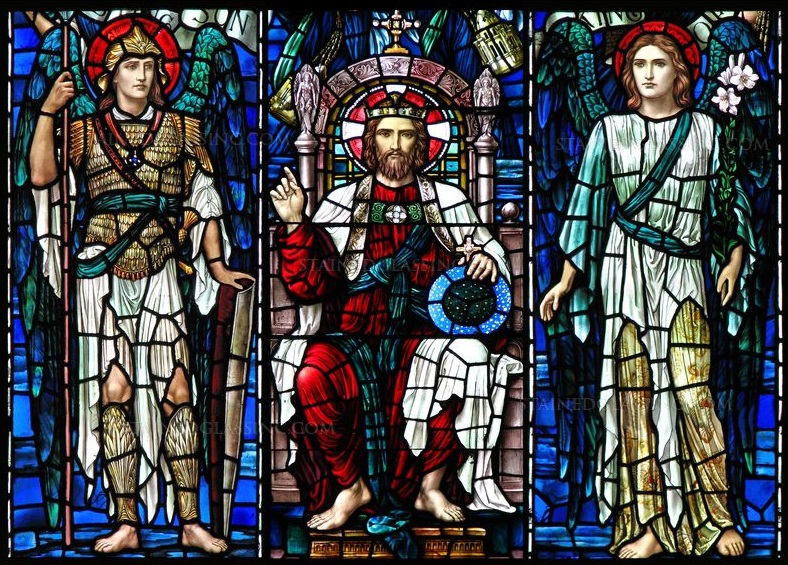This article is part of a series on Old Testament Christophanies. For important background information, see An Introduction to Old Testament Christophanies–with Justin Martyr.

Most of the names of people who saw God in the Old Testament are familiar ones. One of the less familiar people who saw God is the prophet Micaiah son of Imlah. Micaiah may be compared with the prophet Elijah. Like Elijah, Micaiah faced off against Ahab and hundreds of prophets who didn’t speak for the Lord; Elijah and Micaiah could both be sarcastic; and like Elijah, Micaiah too beheld the Son of God. Micaiah’s vision of the Lord occurred during the period when Ahab reigned over Israel and Jehoshaphat reigned over Judah.
In 1 Kings 22 and in 2 Chronicles 18, both kings agreed to join forces and retake Ramoth-gilead from the Arameans. However, Jehoshaphat asked Ahab to first seek a message from Yahweh (1 Kgs 22:1–5; 2 Chr 18:1–4). Ahab assembled around four hundred prophets and asked them if he should attack Ramoth-gilead. The prophets answered that Adonai (“the Lord”) would give the city to Ahab (1 Kgs 22:6). While Adonai often is used to refer to Yahweh, it doesn’t have to. It can be used to refer to some other lord or master. The 2 Chronicles account has the prophets answering that Elohim (“God”) would hand over the city (18:5). Elohim can, at times, be used to refer to a god other than Yahweh. In 1 Kings 22:7–8 and in 2 Chronicles 18:6–7, we read that after hearing from Ahab’s prophets, Jehoshaphat specifically asked if there was a prophet of Yahweh the kings could hear from. Ahab answered that there was one prophet who could consult Yahweh for them: Micaiah son of Imlah. However, Ahab hated Micaiah because he only prophesied evil for him. The Targum replaced “the LORD” in 1 Kings 22:8 with “the Word of the Lord,”[1] which results in Ahab saying that Micaiah received his prophecies from the Word (Memra). Micaiah was the Lord’s instrument. Ahab’s hatred of Micaiah was actually a hatred of the Lord—a hatred of the Son of God.
Jehoshaphat convinced Ahab to call for Micaiah (1 Kgs 22:8; 2 Chr 18:7). After Ahab asked Micaiah if he should launch the attack, Micaiah sarcastically answered that Ahab would win the battle. Ahab insisted that Micaiah speak nothing but the truth in “the name of the LORD” (1 Kgs 22:15–16; 2 Chr 18:14–15). According to the Targum, Micaiah was told to speak the truth in “the name of the Word of the Lord.”[2] The Word of the Lord is a name, one that was used in place of the holy name Yahweh. At the Second Coming of Messiah Jesus, “His name is called the Word of God” (Rev 19:13).
Micaiah answered that he had seen all Israel scattered on the mountains, like sheep without a shepherd. Micaiah further said that the Lord told him that the Israelites had no master and that they should return to their homes in peace (1 Kgs 22:17; 2 Chr 18:16). The implication was that Ahab would be killed in the upcoming battle, leaving the people without a king. After hearing Micaiah’s answer, Ahab said to Jehoshaphat, “Did I not tell you that he would not prophesy good concerning me, but evil?” (1 Kgs 22:18; 2 Chr 18:17). At this point, Micaiah was compelled to speak further:
Micaiah said, “Therefore, hear the word of the LORD. I saw the LORD sitting on His throne, and all the host of heaven standing by Him on His right and on His left (1 Kgs 22:19; see 2 Chr 18:18).
As Micaiah spoke, Ahab and Jehoshaphat sat on their thrones, both kings arrayed in robes (1 Kgs 22:10; 2 Chr 18:9). Micaiah peered into the throne room of God, making him bold enough to remind these two earthly kings that above them reigned a far more exalted king.
Gill explained that Micaiah saw the Lord
as if he had seen with his bodily eyes the divine Being in a glorious form, as a king sitting on his throne, to do justice and judgment; as Ahab and Jehoshaphat were now sitting on their thrones, only as a far greater King, even the King of kings, and in a more splendid manner.[3]
The true king of Israel was and is the King of kings, the Son of God.
Micaiah continued to recount his vision, wherein the Lord accepted one spirit’s offer to entice Ahab by becoming a deceiver in the mouths of the king’s prophets. Micaiah then declared that the Lord had placed a deceiving spirit in the mouths of the prophets and that He had pronounced Ahab’s doom (1 Kgs 22:20–23; 2 Chr 18:19–22). Ahab disguised himself during the battle (1 Kgs 22:30; 2 Chr 18:29), but that couldn’t save him. A randomly shot arrow hit Ahab and he bled to death (1 Kgs 22:34–35; 2 Chr 18:33–34). Ahab sought to rule separate from the authority of Israel’s eternal king, so the Son of God passed judgment upon His rebellious subject.
[1] Targum Jonathan to 1 Kings 22:8.
[2] The Targum of Chronicles: 2 Chronicles 18:15.
[3] Gill, Exposition, 1 Kgs 22:19.

Great article! To Him be the glory!
Amen! Thank you Doctor.
God bless you sir